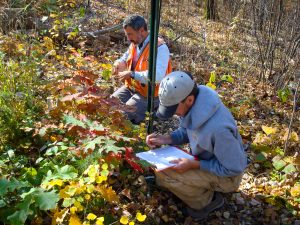Climate change is altering boreal forests, but it’s not too late, U-M researcher says
Boreal forests like the ones found in Canada, Siberia and Alaska help regulate the Earth’s temperature.

Researchers measure saplings growing on an experimental plot at a University of Minnesota field site in northeastern Minnesota.
Boreal forests are in the coldest parts of the world, places like Siberia, Scandinavia and Canada, but are also located in spots on the northern fringes like Michigan’s Upper Peninsula, Minnesota and Maine. Unlike tropical rainforests where thousands of species might be working together, boreal forests are dominated by just a dozen different tree species.
They’re some of the world’s largest forests and most important for climate change regulation.
Dr. Peter Reich is a forest ecology expert and University of Michigan researcher. He tells WDET’s Russ McNamara that – unsurprisingly – in his new study published in the journal Nature, climate change would have a disproportionate effect on boreal forests.
“In our study, we tested the main tree species in forests in northern Michigan, central Canada and northern Minnesota, how they would fare under the climate of the future. And we did this outdoors without any kind of enclosure or chamber by using heat lamps and buried cables that heat the soil. So we’re basically using a very realistic experiment for five years to see how the seedlings fare in terms of whether they grow faster or slower and have greater mortality or less mortality than seedlings planted in control plots nearby. And so when we did this, we saw that two of the most abundant species in the boreal forest, spruce and fir did very poorly with even modest warming, they died a lot faster and higher numbers and they grew much more slowly.”
Listen: Slowing climate change will help keep most of the boreal forests intact.
Russ McNamara, WDET News: Is there something about evergreens and conifers that makes them more susceptible to climate change?

Dr. Peter Reich, University of Michigan researcher: In this particular case, it’s probably because they’re very well adapted to the climate in this boreal forest, which historically has been very cold in the winter and cool and moist in the summer. So they’re evolved to deal with the short growing seasons and cooler temperatures. And so the warmer temperatures, which is still not hot by global standards, the warmer temperatures that we might experience in the future in these boreal forests is too hot for them to handle.
Is it too late to prevent the effects of climate change on these forests? I’m guessing some of these forests already seeing some of the effects.
Yes, forests are already seeing the effect. And that for sure will continue. But by no means is it too late. Because we have the means of slowing and stopping climate change within decades, if we actually put our minds and our engineering and our policies towards that. Although there will be negative repercussions for the forest — even in the best case scenario — they’re pretty resilient. Now, at the very southern edges of them in places like Northern Michigan, there’s certainly going to be some decline in these forests in the next 10, 20, 30, 40 years. But by slowing climate change, we can keep the vast majority of this forest intact, and give more time for other tree species around them such as oaks and maples to take their place and compensate and keep a healthy forest in place.
Read the full study in Nature.
Photo credit: Raimundo Bermudez, University of Minnesota
Trusted, accurate, up-to-date.
WDET strives to make our journalism accessible to everyone. As a public media institution, we maintain our journalistic integrity through independent support from readers like you. If you value WDET as your source of news, music and conversation, please make a gift today.
